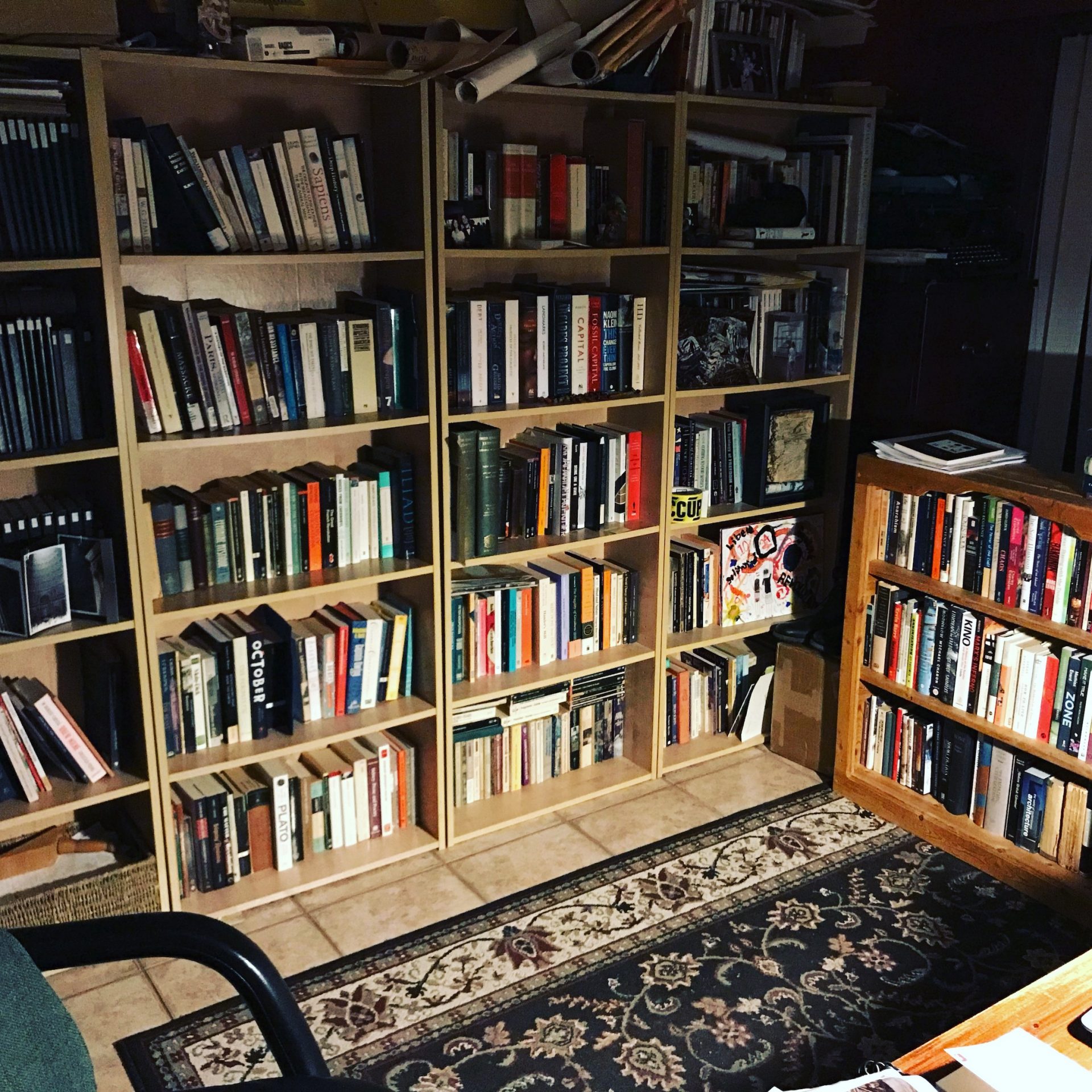
My Dim Portal
I am: on a peninsula, water on three sides a short walk away, dangling south off a broad river delta. The international border cuts across the tip of the peninsula, so heading south I cannot reach the sea without the correct papers. A thought I cheer myself with: a mere 10,000 years ago, this was an island, lost in the sea, captured and moored now by riverine silt. So I am here on a lost island, a once-upon-a-time island, a place of remembered separation.
Before me: the desk, lightly cluttered. A bit of dry blackberry cane, a few favourite stones and shells, a snail’s shell picked up off a path on the South Downs, a crab claw, some dried barley, a varied thrush’s orange feather. Photographs. Postcards of some of Blake’s paintings. Books, notebooks, computer, pens etc.
Around me: the Dim Portal, bookshelves on three sides, the space packed tight, corner of the basement, glass door to the back garden, butterfly bush, camellia, chestnut, tall firs making much shade.
The Dim Portal is in perpetual motion, which is much of what makes it a Dim Portal. The books move, and I pursue. The order is organic. Or idiosyncratic. Or, better, bioregional. Topographic. Not random. There are areas where poetry flourishes, slim volume next to slim volume. More than one area in fact. There are zones—often low lying areas or higher altitudes, often to one side or the other, where novels and histories or philosophies gather. Books I’ve read, some of them long ago, but cannot quite let go, even though I do not journey there often anymore. While the poetry—reference books, dictionaries, books in a few other languages—are visited more frequently, part of my usual rounds.
At the edges: things are mostly still and quiet, the only movement being in the rows of old journals, to which I must turn routinely. The real action—the heavy traffic, the path walked back and forth on a daily basis—the centre at which the Portal turns and admits passage—is directly at my back, what I face when I spin from my desk to consult the shelves I then find before me, from heart to eye level, and within the span of my outstretched arms. Here are the several shelves that hold my most familiar friends—and those books that form part of whatever I am currently researching, whatever I am dreaming of reading, where I think the next book I write will materialize.
Only they don’t keep still: they are the spiralate centre of the Portal, around which everything here turns. When I am too busy to work directly on them, when the project must wait for other tasks to be completed, I look longingly at these unread volumes, knowing the unrealized possibility of the as yet unwritten vibrates, hums, throbs there. I touch the spines of these books. I shuffle their order, rethinking importance, core values, the order in which they must be read, which volume connects more directly to which. Genre is meaningless. They are histories, biographies, poetry, the occasional novel, the occasional theoretical work. They are what I think I need to know. Would like to know. In order to write.
And each day: the Portal turns, admits new books, exiles some that remain unread. Drift towards the corners of the room, the out-of-the-way shelves, where they cool like coals cast from the fire. All the while, new fuel is thrown on the heated shelves at the centre of things, glows, throbs there, molten and mutable, whispers of journeys to take—even if just across the few feet of carpet, even if just from the desk to the shelves behind me—come closer, the Portal whispers, opening, its vortex circling faster—come closer, we might write something yet, we might learn something new, we might be transported and transformed.
Stephen Collis teaches poetry and creative writing at Simon Fraser University, British Columbia
https://www.sfu.ca/english/test-page/faculty-by-name/profiles/steve-collis.html